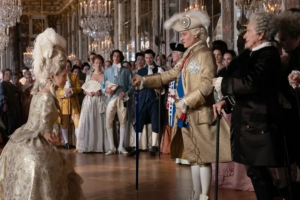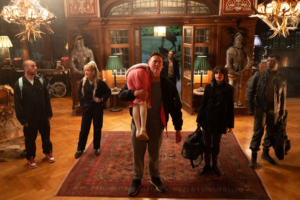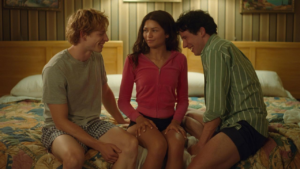Reviewed by GREG KING
Director: Michael Haneke
Stars: Isabelle Huppert, Jean-Louis Trintignant, Mathieu Kassovitz, Franz Rogowski, Fantine Harduin, Toby Jones.

Another typically downbeat, disturbing and grim drama from the misanthropic Austrian filmmaker Michael Haneke (The White Ribbon, Funny Games, Amour, etc). Set in the coastal town of Calais, the film follows the affluent but dysfunctional Laurent family, who live in luxury and seem unaware of the refugee crisis on their doorstep. The film works in heavy themes of matricide, suicide, power, corruption, secrets, middle class guilt, the refugee crisis, social media, class and status. And despite the title, there is no happy ending for this fractured family and their poisonous interpersonal relationships.
Ailing family patriarch Georges (a role written specifically for legendary French star Jean-Louis Trintignant who starred in Haneke’s Amour) has handed over the control of the family’s construction business to his hard-nosed workaholic daughter Anne (Isabelle Huppert). He is looking for a way to commit suicide before his memory and faculties fail him. Anne’s son Pierre (Franz Rogowski, from Victoria, etc) is a self-destructive alcoholic, and resentful of his family’s wealth and business and the way they treat the immigrant community of Calais. Anne’s brother Thomas (Mathieu Kassovitz) is a respected doctor whose personal life is a bit of a mess. He has unhappily remarried but is now separated and conducting a torrid online affair. He is struggling to care for his troubled and deeply unhappy estranged 13-year old daughter Eve (newcomer Fantine Harduin) after his ex-wife overdoses.
The collapse of a Laurent building site under Pierre’s supervision seems to be the trigger for a series of crises that tear the family and their insular lifestyle further apart. But as is Haneke’s usual style, much of the actual drama takes place off screen. Haneke’s regular cinematographer Christian Berger has used his usual static camera, long takes, and tracking shots to record the drama, all of which keeps us at an emotional distance. Plot threads are suddenly dropped.
This is typically austere, cynical and cold filmmaking from Haneke, who always seems fascinated with the darker side of human nature and dissecting bourgeois values. The material here is tempered with his usual stylistic touches – usual sudden outbreaks of shocking violence, seemingly oblique discussions that have little to do with the main narrative, abrupt jumps between scenes, and some pitch-black comedy to temper the bleak mood. And the pacing is glacial at times.
All of the characters are cold, callous and contemptible, but the performances from the cast are all solid. Huppert, in her fourth film for Haneke following The Piano Teacher, Time Of The Wolf and Amour, brings a coldness to her portrayal of Anne. Kassovitz is restrained as Thomas, while Rogowski brings a sullen and volatile edge to his performance. Harduin delivers a mature and intense performance as the troubled Eve. Trintignant brings a detached touch to his senile octogenarian patriarch. Toby Jones manages to bring a hint of sympathy and empathy to his performance as Lawrence Bradshaw, Anne’s latest boyfriend, a British lawyer brought in to negotiate a resolution to the lawsuit after the building site collapse.
Happy End is an indictment of modern western society and the worst aspects of human nature, and seems to riff on many of the director’s previous films, even down to the casting of Amour stars Trintignant and Huppert as father and daughter. But ultimately this is a somewhat flat and impenetrable film, and one of his least engaging films in a career that spans nearly four decades. Haneke’s grim world view will not be to everybody’s taste.
★★☆



